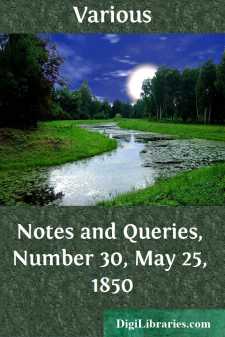Categories
- Antiques & Collectibles 13
- Architecture 36
- Art 48
- Bibles 22
- Biography & Autobiography 813
- Body, Mind & Spirit 142
- Business & Economics 28
- Children's Books 17
- Children's Fiction 14
- Computers 4
- Cooking 94
- Crafts & Hobbies 4
- Drama 346
- Education 46
- Family & Relationships 57
- Fiction 11829
- Games 19
- Gardening 17
- Health & Fitness 34
- History 1377
- House & Home 1
- Humor 147
- Juvenile Fiction 1873
- Juvenile Nonfiction 202
- Language Arts & Disciplines 88
- Law 16
- Literary Collections 686
- Literary Criticism 179
- Mathematics 13
- Medical 41
- Music 40
- Nature 179
- Non-Classifiable 1768
- Performing Arts 7
- Periodicals 1453
- Philosophy 64
- Photography 2
- Poetry 896
- Political Science 203
- Psychology 42
- Reference 154
- Religion 513
- Science 126
- Self-Help 84
- Social Science 81
- Sports & Recreation 34
- Study Aids 3
- Technology & Engineering 59
- Transportation 23
- Travel 463
- True Crime 29
Notes and Queries, Number 30, May 25, 1850
by: Various
Categories:
Description:
Excerpt
NOTES
DR. JOHNSON AND DR. WARTON.
Amongst the poems of the Rev. Thos. Warton, vicar of Basingstoke, who is best remembered as the father of two celebrated sons, is one entitled The Universal Love of Pleasure, commencing—
"All human race, from China to Peru,
Pleasure, howe'er disguised by art, pursue."
&c. &c.
Warton died in 1745, and his Poems were published in 1748.
Johnson's Vanity of Human Wishes appeared in 1749; but Boswell believes that it was composed in the preceding year. That Poem, as we well remember, commences thus tamely:—
"Let observation with extensive view,
Survey Mankind from China to Peru."
Though so immeasurably inferior to his own, Johnson may have noticed these verses of Warton's with some little attention, and unfortunately borrowed the only prosaic lines in his poem. Besides the imitation before quoted, both writers allude to Charles of Sweden. Thus Warton says,—
"'Twas hence rough Charles rush'd forth to ruthless war."
Johnson, in his highly finished picture of the same monarch, says,—
"War sounds the trump, he rushes to the field."
J.H. MARKLAND.
Bath.
In the Lives of English Poets, by William Winstanley (London, printed by H. Clark for Samuel Manship, 1687), in his account of Spenser, p. 92., he says, "he died anno 1598, and was honourably buried at the sole charge of Robert, first of that name, Earl of Essex, on whose monument is written this epitaph:—
"Edmundus Spenser, Londinensis, Anglicorum poetarum nostri seculi fuit princeps, quod ejus Poemata, faventibus Musis, et victuro genio conscripa comprobant. Obiit immatura morte, anno salutis 1598, et prope Galfredum Chaucerum conditur, qui foelicisime Poesin Anglicis literis primus illustravit. In quem hæc scripta sunt Epitaphia.
"Hic prope Chaucerum situs est Spenserius, illi
Prominens ingenio, proximum ut tumulo
Hic prope Chaucerum Spensere poeta poetam
Conderis, et versud quam tumulo proprior,
Anglica te vivo vixit, plausitque l'oesis;
Nunc moritura timet, te moriente mori."
I have also a folio copy of Spenser, printed by Henry Hills for Jonathan Edwin, London, 1679. In a short life therein printed, it says that he was buried near Chaucer, 1596; and the frontispiece is an engraving of his tomb, by E. White, which bears this epitaph:—
"Heare lyes (expecting the second comminge of our Saviour, Christ Jesus) the body of Edmond Spenser, the Prince of Poets in his tyme, whose Divine spirit needs noe othir witness than the works which he left behind him. He was borne in London in the yeare 1510, and died in the yeare 1596."
Beneath are these lines:—
"Such is the tombs the Noble Essex gave
Great Spenser's learned reliques, such his grave:
Howe'er ill-treated in his life he were,
His sacred bones rest honourably here."
How are these two epitaphs, with their differing dates, to be reconciled? Can he have been born in 1510, as the first one says "obiit immaturâ morte?" Now eighty-five is not very immature; and I believe he entered at Pembroke College, Cambridge, in 1569, at which time he would be fifty-nine, and that at a period when college education commenced at an earlier age than now....












